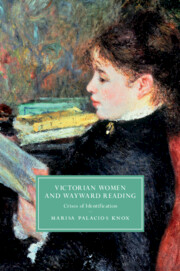Book contents
- Victorian Women and Wayward Reading
- Cambridge Studies in Nineteenth-Century Literature and Culture
- Victorian Women and Wayward Reading
- Copyright page
- Dedication
- Contents
- Figures
- Acknowledgments
- Introduction
- Chapter 1 Masculine Identification and Marital Dissolution
- Chapter 2 Novels without Heroines: Sensation and Elective Identification
- Chapter 3 Character Invasion and the Victorian Actress
- Chapter 4 Antipathetic Telepathy: Female Mediums and Reading the Enemy
- Chapter 5 “The Valley of the Shadow of Books”: The Morbidity of Female Detachment
- Chapter 6 The New Crisis: Can We Teach Identification?
- Notes
- Works Cited
- Index
- Cambridge Studies in Nineteenth-Century Literature and Culture
Chapter 2 - Novels without Heroines: Sensation and Elective Identification
Published online by Cambridge University Press: 30 October 2020
- Victorian Women and Wayward Reading
- Cambridge Studies in Nineteenth-Century Literature and Culture
- Victorian Women and Wayward Reading
- Copyright page
- Dedication
- Contents
- Figures
- Acknowledgments
- Introduction
- Chapter 1 Masculine Identification and Marital Dissolution
- Chapter 2 Novels without Heroines: Sensation and Elective Identification
- Chapter 3 Character Invasion and the Victorian Actress
- Chapter 4 Antipathetic Telepathy: Female Mediums and Reading the Enemy
- Chapter 5 “The Valley of the Shadow of Books”: The Morbidity of Female Detachment
- Chapter 6 The New Crisis: Can We Teach Identification?
- Notes
- Works Cited
- Index
- Cambridge Studies in Nineteenth-Century Literature and Culture
Summary
This chapter examines the genre of sensation fiction, which flourished alongside efforts to introduce British women’s suffrage into the Ballot Act of 1872. Sensation and suffrage were both seen as alarming, unnatural, and immoral attempts for women to gain representation. Sensation novels inspired much critical hand-wringing through their depiction of antiheroines and villainesses that supposedly imperiled the virtue and femininity of the female reader, who identified with them against her will. Modern critics tend to accept sensation’s self-advertisement according to which it elicits a reflexive, psychosomatic response from female readers. This chapter, however, asserts that Mary Elizabeth Braddon’s narrative techniques in her popular sensation novels prompt readers’ awareness of and resistance to the affinities ostensibly endorsed by the novels, soliciting the reader’s choices among multiple possible perspectives. At issue in the arguments for and against women’s enfranchisement were notions of women’s ethical integrity and susceptibility to affective influence. The chapter contends that sensation fiction fomented scandal not because it corrupted impressionable female readers with its content, but because it challenged the automatized emotionalism ascribed to women and promoted, instead, their rational and ethical autonomy – in direct opposition to the premises held by the anti-suffragists.
Keywords
- Type
- Chapter
- Information
- Victorian Women and Wayward ReadingCrises of Identification, pp. 49 - 76Publisher: Cambridge University PressPrint publication year: 2020



